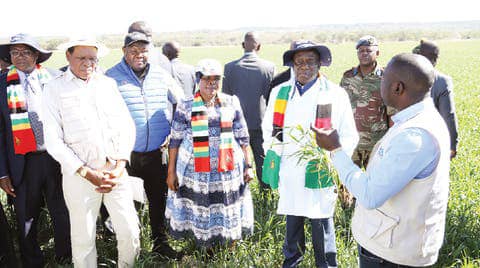Zimbabwe Government has said Yesterday was the last day for wheat planting, but farmers still in the midst of planting can get advice from extension workers if they can stretch the planting in their particular locations.
Government is targeting farmers to produce 405 000 tonnes of wheat from a target of 90 000 hectares.
Zimbabwe estimates that this year’s winter wheat production will surpass last year’s production of 375 000 tonnes following interventions implemented by the Government and private sector engagements to boost a record harvest this season, one that will not just ensure self-sufficiency as last year did for the first time ever, but could provide a small surplus for export into regional markets
Zimbabwe Farmers Union (ZFU) secretary general Mr Paul Zakariya said it was crucial for farmers to work with extension workers to get informed on whether to continue planting or not depending on the region.
Planting wheat after the deadline is not recommended as yields could be compromised by early rains.
While harvesting in rainy periods can damage wheat, it rarely destroys a crop, but farmers have to take a lot of extra precautions.
“It depends on places and type of varieties to continue planting wheat,” said Mr Zakariya. “If conditions of those particular places permit it, farmers should continue to do so. Location needs to be taken into consideration when deciding to continue planting wheat.’’
Zimbabwe Commercial Farmers Union (ZCFU) president Dr Shadreck Makombe said farmers should take farming as a business, adding that more factors needed to be considered to maintain a good harvest for wheat.
Dr Makombe challenged farmers to move speedily, saying it would be costly and disappointing to see the crop being affected by the rains.
It was also critical for farmers to liaise with seed companies for information on the type of seed variety to plant this time.
“Rain is the major obstacle in wheat production,” said Dr Makombe. “Others are still planting but we expected the majority to be finished by the end of May. Advice is now needed for farmers who are still planting. Work hand in hand with extension workers because they will show you the way to go.”
Mrs Martha Mukayu of Chitomborwizi near Chinhoyi said although some farmers wanted to plant wheat early, they failed to do so because of maize harvesting and tobacco selling.
“There was a lot of work to do,” she said. “I grow crops such as maize, groundnuts and sorghum. They all needed harvesting and at the same time tobacco needed to be delivered to the floors and wheat planting needed to be done again. It was difficult for some of us to do all the work at the same time.”
Mr Thomas Chigage of Banket near Maheu said it was critical to plant in May, adding that overlapping to June could cause the crop to be affected by rains.
“We need to follow our dates so that we do not compromise the quality of our crop. Last year the late planted crop was affected. We need to speed up planting to avoid that,” he said.
This season, Government is well prepared to support wheat better than the previous seasons as it is working closely with important stakeholders such as power utility ZESA and the Zimbabwe National Water Authority (Zinwa) to ensure that there was uninterrupted power supply as well as enough water for irrigation in the winter wheat season.










